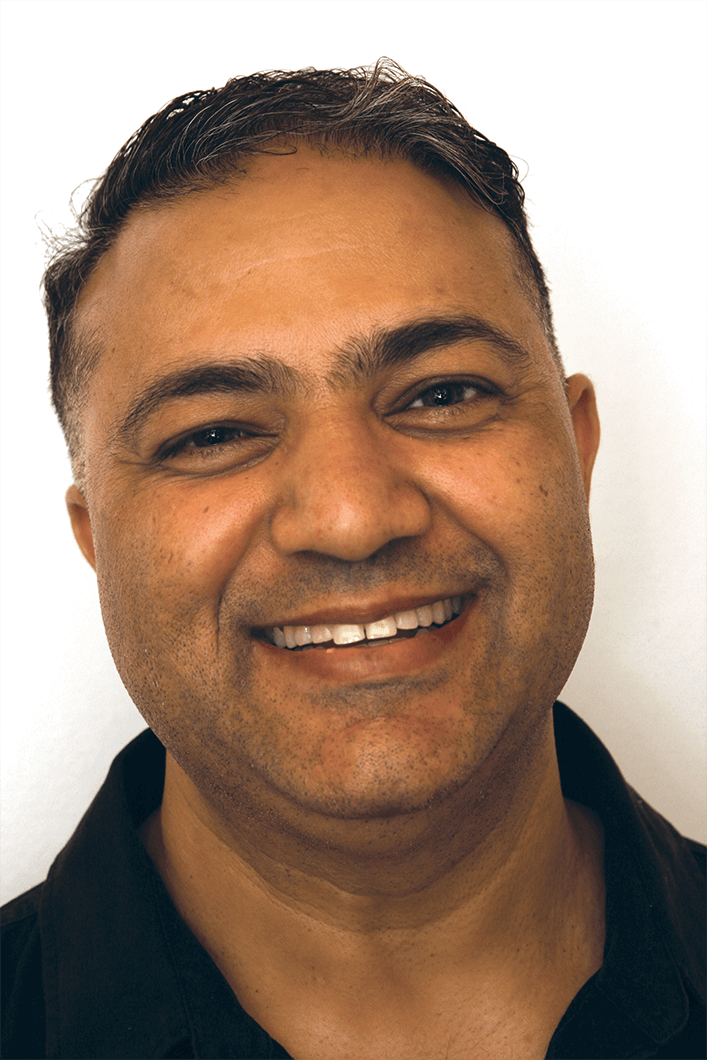 Dinesh Maharaj
Dinesh Maharaj“I now walk with a major limp, but I am walking.”
Dinesh Maharaj, DTM, a facilitator and youth education enthusiast from South Africa, spoke these words a little more than a year after suffering a debilitating stroke in January 2017. Left completely paralyzed on the right half of his body, he spent almost four months in a wheelchair and totally dependent on his family.
Born in Durban, on the east coast of South Africa, Maharaj grew up no stranger to challenges. His father was unable to work as a result of a severe stroke, and his family lived on a farm without electricity or running water. But his mother played a pivotal role in developing his character, encouraging him that education was the only way to a better life. He now encourages his own children and other youths to strive for an education.
Despite a new set of circumstances resulting from his stroke, Maharaj is determined to live his life to the fullest. He lives with his wife and two sons in Westville, Durban. He joined the Umhlanga Club in 2005 and is heavily involved in the Toastmasters Leadership Institute (TLI) and Youth Leadership programs.
Why did you join Toastmasters?
I enjoy the educational aspect. In 2009, four years after I joined, I became a facilitator—a change in career motivated by Toastmasters. I enjoy the professionalism, support and camaraderie at my club meetings. Our unofficial slogan is “The best club in the galaxy.”
What happened after your stroke?
Initially, I lost most of my memory. Gradually, and fortunately, that returned and I am still able to lecture. I spent many hours in tears and anger. Eventually I taught myself the simple basics again. I could hardly speak, but after only a few weeks I was back to educating youths—this time from a wheelchair. My speech became clearer over time, with almost 90 percent ability currently.
I relearned those lessons of never giving up in Toastmasters. I call it Toastmasters therapy.
Describe your career.
I am an adult-skills facilitator, constituent assessor and subject-specific moderator focusing on electronic and mechatronics engineering and various business and management studies. I lecture nationally to varied audiences and enjoy traveling and meeting new people. My audiences range from five people to 50, and most want to advance their careers. I work at various companies like GUD Filters and Engen Petroleum six days a week and at schools in the evenings or mid-afternoon on Saturdays.
I also train 11th grade students in Toastmasters Youth Leadership. I was the District 74 Youth Leadership coordinator and look forward to being in the position again.
What do you like about working with students?
Whenever I graduate Youth Leadership students, I see a warm glow on their parents’ faces, and that motivates me. I appreciate the opportunity to guide youth. The Toastmasters Youth Leadership program becomes so much more than a speaking program; it is a torch in the darkness of vocational ignorance. Table Topics reveals the laughter that young people have and many of us have lost.
What do you appreciate most about Toastmasters?
Toastmasters is my test bed for vocational presentations, and I appreciate the feedback that continues to hone my skill. I am also a Toastmasters Leadership Institute trainer and enjoy imparting my knowledge to other members.
The aspect I enjoy most is the opportunity to understand the indomitable human spirit. For example, I recall a club speaker breaking down in tears over the loss of her father. She stood there, and we all looked on with empathy. She then proceeded to dry her tears, finish her speech and receive a standing ovation. I learned bravery that day, and now when I feel like breaking down I remember that woman, her strength and her perseverance.
What’s next for you?
Recently, I gave a presentation on managing depression at Life Entabeni Hospital in Durban for the Heart and Stroke Foundation. I will continue to motivate anyone with a debilitating ailment, be it a heart condition, some form of cancer, or even a stroke. The spirit of “No retreat, no surrender” burns strong in me, and I want to evoke it in others so they can begin or continue their journey.
Shannon Dewey is a former digital strategy and engagement editor of the Toastmaster magazine. Reach her at sdewey@toastmasters.org.



 Previous
Previous
 Previous Article
Previous Article